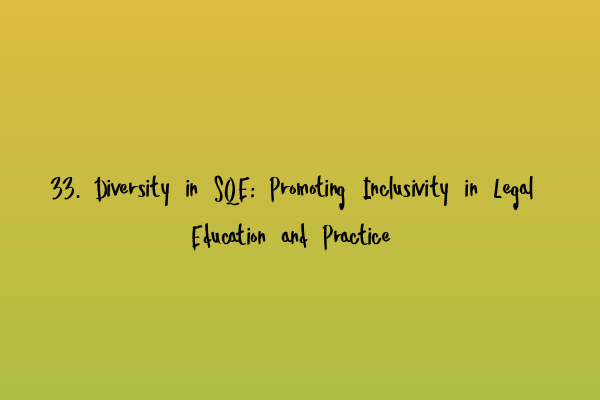Diversity in SQE: Promoting Inclusivity in Legal Education and Practice
In today’s diverse and interconnected world, promoting inclusivity has become an essential aspect of legal education and practice. The Solicitors Qualifying Examination (SQE) is no exception. As future solicitors, it is crucial for aspiring legal professionals to understand and appreciate the value of diversity, both in terms of representation and perspectives. In this article, we will explore the importance of diversity in the SQE, its impact on legal education and practice, and the steps taken to ensure a more inclusive legal profession.
The Influence of Diversity in Legal Education
In legal education, diversity plays a significant role in shaping the perspectives and understanding of future solicitors. By exposing students to a wide range of backgrounds, cultures, and experiences, it allows them to develop a more comprehensive and nuanced understanding of the law. This understanding is vital when it comes to providing accurate and culturally sensitive advice to clients from diverse backgrounds.
Diversity in legal education also helps to challenge stereotypes and prejudices that may exist within the legal profession. By fostering an environment where individuals from all walks of life feel welcome and represented, it encourages innovative thinking and promotes the inclusion of diverse voices in legal discussions.
Furthermore, a diverse student body in legal education creates opportunities for networking and collaboration among students from different backgrounds. This exchange of ideas and perspectives not only enhances the learning experience but also cultivates skills required for effective teamwork and communication in the legal profession.
Promoting Diversity in the SQE
The SQE recognizes the importance of diversity and inclusivity within the legal profession. In recent years, significant steps have been taken to promote diversity in the examination process and ensure fair representation. These steps include:
- Updating the curriculum to include topics related to diversity, cultural competence, and social justice.
- Developing a diverse pool of examiners and assessors to ensure fair assessment and representation of diverse perspectives.
- Implementing measures to reduce barriers to access for individuals from underrepresented groups, such as providing financial support and accommodations for those with disabilities.
By incorporating these measures, the SQE aims to create a level playing field for all aspiring solicitors, regardless of their background or circumstances. It recognizes that diversity and inclusion are not just buzzwords but essential elements for a thriving legal profession.
Impact of Diversity on Legal Practice
The benefits of diversity in legal practice cannot be overstated. When legal teams consist of individuals with diverse backgrounds, experiences, and perspectives, they bring a multitude of ideas and approaches to problem-solving. This diversity of thought can lead to more robust and innovative legal strategies that can better serve clients’ needs.
In addition, diversity in legal practice helps ensure that legal services are accessible to a broader range of clients. It allows solicitors to better understand the unique challenges, cultural nuances, and needs of clients from different backgrounds. This understanding fosters trust and rapport, leading to more effective and client-centered representation.
Moreover, diverse legal teams send a powerful message to clients and the community at large. It demonstrates that the legal profession is committed to inclusivity and equality, making it more approachable and relatable to individuals from diverse backgrounds who may otherwise feel underrepresented or marginalized.
Conclusion
Inclusivity and diversity are not optional in the legal profession. They are fundamental values that must be upheld in order to foster a fair and representative legal system. The SQE recognizes the importance of diversity and inclusivity and has taken significant steps to promote them in legal education and practice.
By embracing diversity, future solicitors can develop a more holistic understanding of the law and provide culturally sensitive advice to clients. Moreover, diverse legal teams can offer innovative and client-centered solutions that better serve the needs of a diverse clientele. Together, we can create a legal profession that reflects the rich tapestry of society and provides equal opportunities for all.
For more information on related legal topics, please check out these articles:
